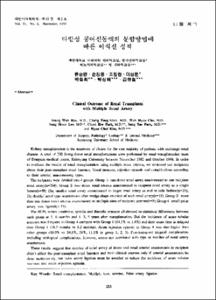다발성 공여신동맥의 문합방법에 따른 이식신 성적
- Keimyung Author(s)
- Ryu, Seung Wan; Cho, Won Hyun; Lee, Sung Mun; Park, Choal Hee; Park, Sung Bae; Kim, Hyun Chul
- Department
- Dept. of Surgery (외과학)
Dept. of Radiology (영상의학)
Dept. of Urology (비뇨의학)
Dept. of Internal Medicine (내과학)
- Journal Title
- 대한이식학회지
- Issued Date
- 1997
- Volume
- 11
- Issue
- 2
- Abstract
- Kidney transplantation is the treatment of choice for the vast majority of patients with end-stage renal disease. A total of 350 living donor renal transplantations were performed by renal transplantation team of Dongsan medical center, Keimyung University between November 1982 and October 1996. In order to evaluate the results of renal transplantation using multiple renai arteries, we reviewed our recipients about their post-transplant renal function, blood pressure, rejection episode and complications according to their arterial anastomosing types.
The recipients were divided into 4 groups: Group 1- one donor renal artery anastomosed to one recipient renal artery(n=288)} Group 2- two donor renal arteries anastomosed to recipient renal artery as a single lumen(n=38) (2a; smaller renal artery anastomosed to larger renal artery as end to side fashion(n=23), 2b; double barrel type anastomosis after wedge shape excision of each renal artery(n=15), Group 3- more than one donor renal arteries anastomosed to multiple sites of recipient arteries(n=s9), Group 4- small polar artery was ligated(n=15).
The BUN, serum creatinine, systolic and diastolic pressure all showed no statistical differences between each group at 1, 6 months and 1,3,5 years after transplantation. But the incidence of acute tubular necrosis was frequent in Group 4 compare with Group 1 (14.3% vs 1.4%) and their onset time is delayed than Group 1 (18.5 months vs 8.2 months). Acute rejection episode in Group 4 was also higher than other groups (80.0% vs 34.5%, 24%, 11.1% in group 1, 2, 3). Post-transplant surgical complication including urological complications, however, seems not correlated with type or number of renal artery anastomosis.
These results suggest that number of renal artery of donor and renal arterial anastomosis in recipient didn't affect the post-transplant renal function and their clinical courses only if arterial anastomosis be done meticulously, but polar artery ligation must be avoided to reduce the incidence of acute tubular necrosis and acute rejection episode.
- Alternative Title
- Clinical Outcome of Renal Transplants with Multiple Renal Artery
- Publisher
- School of Medicine
- Citation
- 류승완 et al. (1997). 다발성 공여신동맥의 문합방법에 따른 이식신 성적. 대한이식학회지, 11(2), 253–262.
- Type
- Article
- ISSN
- 1598-1711
- 파일 목록
-
-
Download
 oak-bbb-03248.pdf
기타 데이터 / 652.48 kB / Adobe PDF
oak-bbb-03248.pdf
기타 데이터 / 652.48 kB / Adobe PDF
-
Items in Repository are protected by copyright, with all rights reserved, unless otherwise indicated.